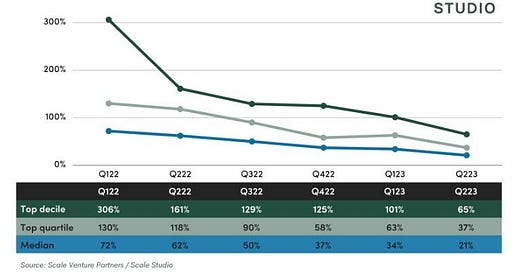One of my VC’s sent me a surprising note this week. Software companies' growth has been slowing down a lot. I’m less concerned about why it’s happening—and I’m more concerned about what to do now, especially since I am living in it, raising money, and trying to survive. Check this out:
As you can see, the median Saas growth rate for top-decile companies over the last 12 months ending June 30, 2023 was 5x lower than it was a year ago.
You can imagine all of the intercompany dynamics that had to happen during this period: product adjustments, ACV expansion tests, sales narrative shifts, letting go of significant volumes of engineers as companies’ R&D budget came screeching to a halt. In some cases you can also imagine how many people had to handle 5x the number of tasks and projects they were managing. With very little increase to pay, if any. The best companies probably didn’t hire anyone, and lost employees to larger organizations who had bigger budgets—and developers need to earn a living too, and pay for their families, so I get it. But man, some of the ideas and companies that will die right now, just because one or two critical employees, with significant amounts of intellectual capital, just up and left. And yes, there are a few, a handful of folks, who thrived, because of market inefficiencies, brilliance, strategy insights, hard work, you name it. Some people killed it.
When I started in software, I learned about the "trough of sorrow." This dynamic poses a big challenge in the world of startups.
A lot of companies are going through the “trough of sorrow” right now, in addition to a significant market correction, because overall sales numbers are declining at a macro level, as I described in the above clip from Scale Studio, and at a micro level as described by this diagram. And you don’t ever really know if you’re in the trough of sorrow, or if you’re just inside of a misguided organization. Both are possible, and this is what makes it so difficult for startups to succeed.
I’ve learned that taking in the macroeconomic data is important, but there is really only one solution to properly digging yourself out of the hole:
Curiosity.
Cultivating an ever-curious mindset isn't just a desirable quality; it's essential for effectively navigating and overcoming the myriad challenges that startups in every industry encounter nowadays.
One of the things I really admire about people in the startup world is their assertiveness and willingness to help others, sharing what they’ve learned, especially when faced with challenging and complex problems. It's this incredible quality that brings people together to collaborate and find innovative solutions, especially in a world that needs them more than ever.
I really believe that the best and most groundbreaking ideas are born in times of uncertainty and adversity. That's why it's so important to cultivate a genuine love for learning because it fuels our ability to think critically, adapt quickly, and come up with game-changing solutions. I've seen this firsthand at Elements, where our collective wisdom and commitment to continuous learning have propelled us to new heights of knowledge and innovation in just the past 90 days, which to me, has surpassed the learning I have experienced the entire previous year.
We have three core values: be curious, take action, and share insights. These three values have really aligned our team, stronger than any team I have ever worked on. They have not only helped our team, but they’ve helped me, too: Several of the values were potential blind spots for my own learning and growth.
I think a desire to learn, to lean into problems with deep curiosity, is ultimately what has helped us decipher the path ahead. This is an incredible time to learn. Just like lifting more weight in the gym builds strength, pushing ourselves to learn and navigate complexity unlocks limitless potential.
Individual learners and companies with a deep sense of curiosity will have an opportunity to transform themselves during this time. Organizations that are driven by an insatiable appetite for knowledge and are unafraid to explore new territories are the ones I look to for leadership. When teams are aligned around the common goal of solving big problems, there's an undeniable energy that helps them conquer formidable obstacles.
It has been my team's experience that some of our most beneficial ideas, for society at large, were born during very challenging times.






Way to stick with the challenges and adversity for “the occasional beautiful vistas and thrilling bursts of speed.” It’s all fun and worth it in my opinion.